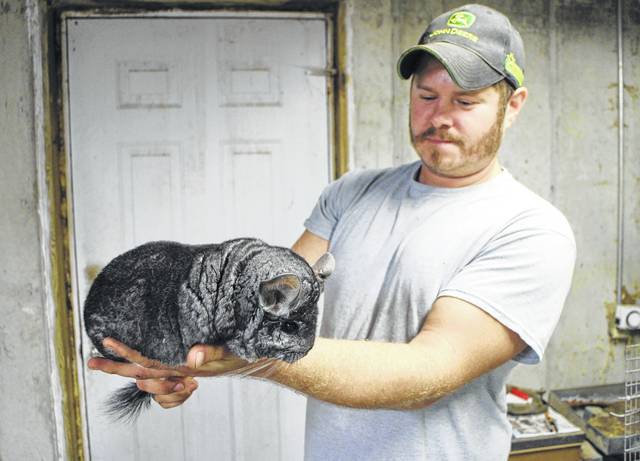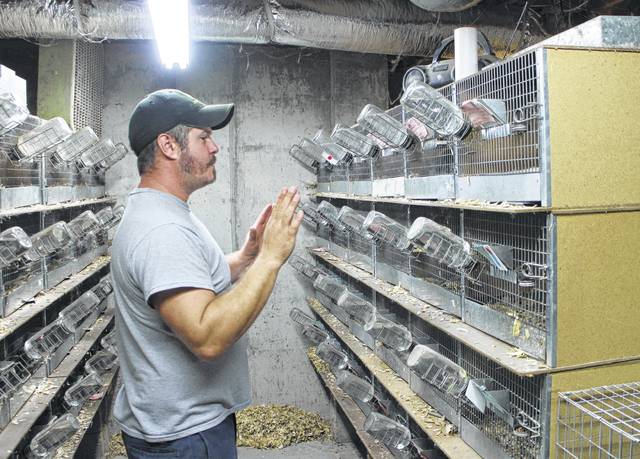

Believe it or not, it takes a lot of time and effort to become an established chinchilla rancher. Raising the fluffy desert rodents, especially on a large scale, can be extremely tedious due to their dietary and environmental needs, not to mention the challenge of getting them to breed – but somewhere in the last 23 years, the Fauber family has figured it out.
Rick Fauber and his twin sons Jeoff and Scot have worked with animals for years. Like many farming families in Highland County, the Faubers have raised all sorts of livestock, such as hogs, cattle and chickens, but they set themselves apart in 1994 when they began building a herd – yes, a herd – of chinchillas, which they now sell wholesale to pet stores around the country.
“As a young boy, I always enjoyed getting out, hunting and trapping small animals,” said Rick, “and I’d read some articles about raising chinchillas when I was young. I was always kind of impressed, and I wanted to be involved with that. But there wasn’t really anybody in this area that did that.”
Years later, after Jeoff and Scot were born, Rick said he read an article about a chinchilla ranch in Columbus, and ended up paying them a visit.
“They invited us up to take a look around their ranch,” he said. “At the time, they had about 5,000 animals. We just kind of decided to get a few runs, we started out with eight and thought we would just experiment with it, I guess. The boys were eight years old, and they helped me out, kind of got interested in it. I stayed small for some time until the boys got older and Jeoff got interested. Then they started to grow it, and I turned it over to Jeoff. He had the best interest and a good eye for what he was working with.”
And Jeoff’s “good eye” paid off. The herd eventually grew to about 500 of what Jeoff described as some of the purest-bred chinchillas in the country.
On Friday, Jeoff offered The Times-Gazette an insider’s look at the ranch, located in Rick’s climate-controlled basement, allowing a small glimpse into the tedious and occasionally lucrative world of chinchilla husbandry.
“I can tell you, they are not easy,” Jeoff said. “It’s not like anything most people think.”
Chinchillas originate from the arid deserts and mountain ranges of Argentina, according to Jeoff, and require a cool, dry atmosphere and plenty of fresh air to properly maintain their fur, which is the animal’s most desirable feature.
Jeoff said chinchillas have incredibly soft, thick fur, with most sprouting 80-100 hair follicles for every pore in their skin.
Domesticated chinchillas also have a demanding diet of nutritional pellets, which, if not properly blended, can result in mass casualties. Jeoff said he lost 70 chinchillas in one day to chinchilla feed that had bad hay in the mix.
If all goes well, though, chinchillas can live to be 20 years old or more, and grow as large as full-size rabbits.
Unlike many rodents, chinchillas can be very good parents, Jeoff said. Females give birth to furry babies, often pulling them out using their hands, which have fingernails instead of claws.
They eat with their hands, too, “just like us,” Jeoff said.
Jeoff said the business has changed over the years, but has stayed profitable all along. When fur garments were more popular a number of years ago, Jeoff said the Faubers used to sell about 200 chinchilla pelts a year to be made into coats, often selling the hides for about $70 apiece. One coat that Jeoff made ended up selling for $70,000 before the market began to decline.
Now, the Faubers mainly sell the animals wholesale as pets, and separately sell their finer breeding chinchillas to other ranches. The breeders make the most money, Jeoff said, often selling for $1,000 per animal, although one particularly pure chinchilla sold for $8,000 a while back.
Jeoff said his favorite part of chinchilla breeding is taking the animals to shows, where they’re judged on genetic purity, fur quality and other breeding aspects. Although he’s never won first place at a national show, he’s taken second and third a number of times.
“It’s a beauty contest,” he joked. “I love the competition of it… I figure once I win first place, I’ll slow down a little bit,” he said.
Until then, the ranch will continue to put out about 400 baby chinchillas per year in an effort to produce a more pure genetic product – and Jeoff will keep doing what he loves.
“I fell in love with it when I was a kid… and I just stuck with it,” he said. “This is more challenging than I would have ever dreamed. I just love watching them grow.”
Fauber Chinchillas is located at 6045 Roundhead Road, and can be found online at www.fauberchinchillas.com.
Reach David Wright at 937-402-2570, or on Twitter @DavidWrighter.



